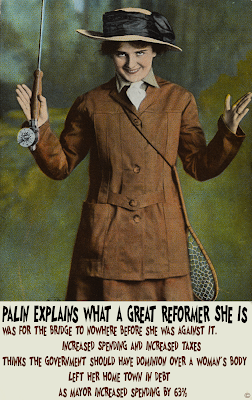
The press helps McCain whitewash Bush
CNN.com announced last week that among McCain's top political priorities for the Republican convention was his "need to make it clear that his first term will not be Bush's third term."
In fact, it was probably the worst kept secret in St. Paul: McCain had to completely cut ties with the wildly unpopular Republican incumbent and his record of failure. Republicans in St. Paul sure did their best whitewashing Bush: For the entire convention, Bush's name was only mentioned six times from the podium, according to a running count kept by a Los Angeles Times blog.
But how to erase Bush completely? Sitting presidents traditionally enjoy high-profile send-offs at conventions. When Ronald Reagan bid farewell to the GOP faithful at the party's 1988 convention in New Orleans, he addressed party activists at length the day before the convention began, he was fêted with an 18-minute video tribute inside the Superdome the next night, and then delivered the evening's keynote address.
Republicans in St. Paul seemed to catch a political break when, thanks to the threat of Hurricane Gustav, they were able to ease Bush out of the spotlight when Bush announced he had to monitor the storm and could not attend the convention. But then Bush turned around and, according to one report, demanded some convention face time (via satellite, as it turned out), creating a potential PR mess for Republicans.
Fast forward to McCain's convention speech Thursday night and immediately upon its conclusion, MSNBC's Chris Matthews reiterated that if McCain had a chance at winning the White House, he had to separate himself from the unpopular GOP incumbent, and that with his Thursday night address, McCain had "effectively" done so.
"It is dramatic and may well be the one brilliant move that could win him the election," Matthews announced, toasting McCain as some sort of Harry Houdini.
But if McCain did pull off the great escape, it was only thanks to the press and the way eager journalists pitched in to erase Bush from the political picture.
And here's why: The press is just as anxious as McCain to have Bush go away. The press is just as anxious as McCain to forget about the failures of the last eight years. Why? Because the press, like McCain, is partly to blame for Bush's White House misadventure.
And that's why Bush was a non-story in St. Paul and remains a non-story in the unfolding campaign. Forget about the 15,000 journalists who were camped out at the Xcel Energy Center and supposedly desperate for even the hint of internal struggles and political squabbling in order to create news at the tightly scripted event. Forget about the press glomming on to the Bush-McCain story the way journalists did in Denver the week before when they displayed an insatiable appetite to speculate about and hype supposed conflicts over the speaker scheduling at the Democratic convention.
It's true that on the surface, two convention storylines appeared remarkably similar. "The Democrats had the awkwardness of the Clintons at their convention," the Associated Press noted. "Republicans now have their version of a precarious guest: President Bush."
But boy, the coverage sure wasn't the same. On the day Hillary Clinton addressed the convention in Denver, there were more than 1,200 mentions of "Clinton" on cable and network news, according to TVeyes.com. The following day, when Bill Clinton spoke, there were more than 1,500 mentions. By contrast, on the day that Bush addressed the GOP convention, TV news outlets made reference to him only 500 times.